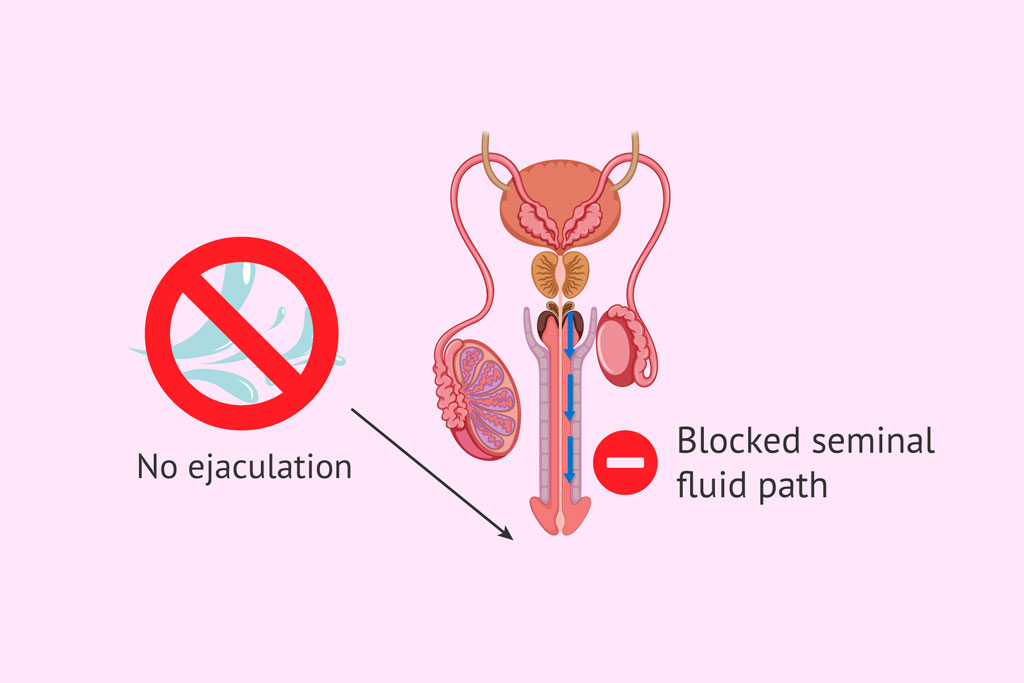Types of Aspermia
You may have complete aspermia, where there is no semen at all in the ejaculate. It is completely absent. In partial aspermia, there will be some semen, but the volume will be highly reduced.
Symptoms of Aspermia
One of the major symptoms of aspermia is that there is no semen or ejaculate during ejaculation. Other symptoms of aspermia may include:
- A feeling of dryness during orgasm
- Blurred or hazy urine after sex
- Reduced semen volume: Even if some semen is ejaculated, its volume will be very low.
- Lack of satisfaction after sex
- Mental and emotional problems due to loss of pleasure during sex
Causes of Aspermia
The causes of aspermia may be attributed to retrograde ejaculation. Ejaculatory duct obstruction is another cause. Sexual dysfunction is another cause of aspermia.
In the condition of retrograde ejaculation, the semen goes into the urinary bladder. In a man who is not suffering from this condition, the semen will enter the urethra and exit through the penis.
There will be growths or blocks in the ejaculatory ducts when there is ejaculatory duct obstruction. These blocks do not allow the semen to pass through, resulting in aspermia.
Sexual dysfunction and male infertility are connected. A study has revealed that sexual dysfunction causes aspermia in about 72% of men suffering from this condition.
Androgen deficiency is one of the causes of aspermia. It is related to problems of puberty. Your prostate gland and the seminal vesicles may not grow properly. They will not develop fully and remain small. The glands will not produce semen. Hence, there is none to ejaculate.
Other causes of aspermia can be:
- Exposure to radiation
- Hormone imbalances
- Some medicines
- Congenital aspermia: Your genitalia may be underdeveloped at birth, causing an absence of semen and sperm.
- Spinal cord injury: Lumbar injury or disease of the nerves that affect ejaculation can cause aspermia.
- Inflammation: Any inflammation in your reproductive system can cause issues with semen production. Ejaculation may also be affected.
- Psychological factors: Temporary aspermia may arise due to stress and anxiety in connection with sexual performance.
- Medical conditions: Surgery to the prostate or cancer treatments can cause aspermia.
Diagnosing Aspermia
Semen analysis is the main method adapted to diagnose aspermia. Imaging techniques can help discover ejaculatory duct blockage. Nerves that are responsible for ejaculation may be evaluated. Your doctor will also conduct a complete physical examination and will study your medical history in detail.
Aspermia Treatment
Aspermia is treatable with the right medications. The treatment may be useful in the condition of retrograde ejaculation. The medicines can shut the mouth of the urinary bladder. Hormonal imbalances can be corrected by treating them with medical treatment.
In some cases surgical retrieval of sperm may be performed. Another surgical aspermia treatment method is Transurethral Resection of the Ejaculatory Ducts (TURED). This fixes the obstruction in the ejaculatory duct.
Conclusion
Aspermia is a cause of male infertility. The sperm and semen are retained in the body. They do not get ejaculated. The cause of aspermia has to be determined to prescribe the right treatment method. The condition may cause emotional problems and anxiety. It can also lead to friction between the couple. Their relationship may be under duress. Aspermia is treatable and can be cured. There is no need to lose hope.
